Betriebliche Dynamiken und Beschäftigungsergebnisse
Firmengründungen und -schließungen sind in einer Marktwirtschaft für die Reallokation von Ressourcen, strukturellen Wandel und damit für die wirtschaftliche Entwicklung von zentraler Bedeutung und spielen vor allem im Hinblick auf die wirtschaftliche Transformation Ostdeutschlands eine zentrale Rolle. Gleichzeitig können die mit dem Strukturwandel verbundenen Arbeitsplatzverluste dramatische Folgen für betroffene Arbeitnehmer haben, wie z.B. Arbeitslosigkeit, Einkommensverluste oder eine geringere Arbeitsplatzqualität. Diese Forschungsgruppe untersucht mithilfe mikroökonometrischer Methoden Gründungen, Wachstumsprozesse und das Scheitern von Unternehmen, die Anzahl und Qualität der von Neugründungen geschaffenen Arbeitsplätze und die Folgen von Firmenschließungen für betroffene Arbeitnehmer und Arbeitnehmerinnen, vor allem in Bezug auf Arbeitsmarktergebnisse wie Beschäftigung und Löhne.
Forschungscluster
Produktivität und InstitutionenIhr Kontakt

Mitglied - Abteilung Strukturwandel und Produktivität
PROJEKTE
01.2020 ‐ 06.2024
Europas populistische Parteien im Aufwind: die dunkle Seite von Globalisierung und technologischem Wandel?
VolkswagenStiftung
Die Globalisierung hat zwar allgemein den Wohlstand gesteigert, aber in vielen Regionen Europas auch zu Arbeitslosigkeit, Lohnungleichheit, Abwanderung und Überalterung geführt. Das Projekt untersucht, ob diese ökonomischen Lasten zu Wählerstimmen für populistische Parteien führen.
01.2019 ‐ 06.2022
MICROPROD („Raising EU Productivity: Lessons from Improved Micro Data“)
Europäische Kommission
Ziel von MICROPROD ist es, zu einem besseren Verständnis der Herausforderungen beizutragen, die die vierte industrielle Revolution in Europa mit sich bringt. Verliert das Produktivitätswachstum im Kontext von Globalisierung und Digitalisierung an Schwung, und wenn ja, warum?
This project has received funding from the European Union’s Horizon 2020 research and innovation programme under grant agreement No 764810.
07.2018 ‐ 12.2020
Firmenlohndifferentiale in unvollkommenen Arbeitsmärkten: Die Rolle von Marktmacht und industriellen Beziehungen in der Aufteilung der Beschäftigungsrenten zwischen Arbeitnehmern und Arbeitgebern
Deutsche Forschungsgemeinschaft (DFG)
Ziel dieses Projekts ist es, die Aufteilung der Beschäftigungsrenten auf unvollkommenen Arbeitsmärkten und den Einfluss von Arbeitsmarktinstitutionen wie Tarifbindung und betrieblicher Mitbestimmung auf Firmenlohndifferentiale zu untersuchen. Über die Grundlagenforschung hinaus hat das Projekt damit Potential, wichtige wirtschaftspolitische Debatten zur institutionellen Ausgestaltung des Lohnfindungsprozesses zu informieren.
02.2019 ‐ 09.2019
Auswertung des IAB-Betriebspanels 2018 und Erstellung eines Ergebnisberichts für West- und Ostdeutschland
04.2016 ‐ 03.2019
Lohn- und Beschäftigungseffekte von Insolvenzen
Deutsche Forschungsgemeinschaft (DFG)
Ziel des Projekts ist es, erstmals den Prozess und die Folgen des Scheiterns von Unternehmen ausführlich zu analysieren. Insbesondere ist es im Rahmen dieses Projekts erstmals möglich, die Folgen kleinbetrieblicher Insolvenzen zu erforschen, was vor allem deshalb relevant ist, weil Arbeitnehmer in Betrieben mit weniger als zehn Beschäftigten etwa viermal so häufig von Insolvenzen betroffen sind wie Arbeitnehmer in Großbetrieben.
01.2018 ‐ 12.2018
Auswertung des IAB-Betriebspanels 2017 und Erstellung eines Ergebnisberichts für West- und Ostdeutschland
01.2017 ‐ 09.2017
Auswertung des IAB-Betriebspanels 2016 und Erstellung eines Ergebnisberichts für West- und Ostdeutschland
Referierte Publikationen
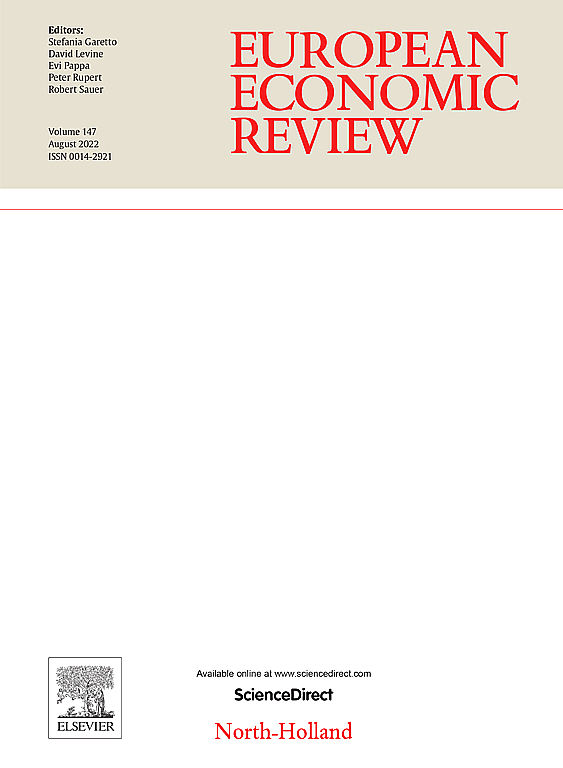
Returns to Skills around the World: Evidence from PIAAC
in: European Economic Review, January 2015
Abstract
Existing estimates of the labor-market returns to human capital give a distorted picture of the role of skills across different economies. International comparisons of earnings analyses rely almost exclusively on school attainment measures of human capital, and evidence incorporating direct measures of cognitive skills is mostly restricted to early-career workers in the United States. Analysis of the new PIAAC survey of adult skills over the full lifecycle in 23 countries shows that the focus on early-career earnings leads to underestimating the lifetime returns to skills by about one quarter. On average, a one-standard-deviation increase in numeracy skills is associated with an 18 percent wage increase among prime-age workers. But this masks considerable heterogeneity across countries. Eight countries, including all Nordic countries, have returns between 12 and 15 percent, while six are above 21 percent with the largest return being 28 percent in the United States. Estimates are remarkably robust to different earnings and skill measures, additional controls, and various subgroups. Instrumental-variable models that use skill variation stemming from school attainment, parental education, or compulsory-schooling laws provide even higher estimates. Intriguingly, returns to skills are systematically lower in countries with higher union density, stricter employment protection, and larger public-sector shares.
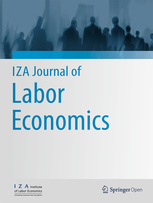
The Levelling Effect of Product Market Competition on Gender Wage Discrimination
in: IZA Journal of Labor Economics, Nr. 19, 2014
Abstract
Using linked employer–employee panel data for West Germany that include direct information on the competition faced by plants, we investigate the effect of product market competition on the gender pay gap. Controlling for match fixed effects, we find that intensified competition significantly lowers the unexplained gap in plants with neither collective agreements nor a works council. Conversely, there is no effect in plants with these types of worker codetermination, which are unlikely to have enough discretion to adjust wages in the short run. We also document a larger competition effect in plants with few females in their workforces. Our findings are in line with Beckerian taste-based employer wage discrimination that is limited by competitive forces.
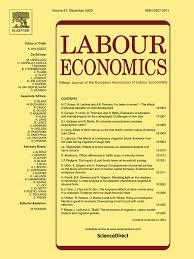
Do Better Pre-migration Skills Accelerate Immigrants' Wage Assimilation?
in: Labour Economics, 2014
Abstract
This paper analyzes wage assimilation of ethnic German immigrants to Germany using unique administrative data that include an administrative estimate of immigrants' expected wage in Germany at the time of migration. We find that a 10% higher wage potential translates into a 1.6% higher wage in Germany when also controlling for educational attainment, thus pointing at partial transferability of pre-migration skills to the host country's labor market. We also document that wage assimilation is significantly accelerated for immigrants with higher wage potentials. Our results are both in line with complementarities between pre-migration skills and host country-specific human capital and a U-shaped pattern of immigrants' job mobility with initial downgrading and subsequent upgrading.
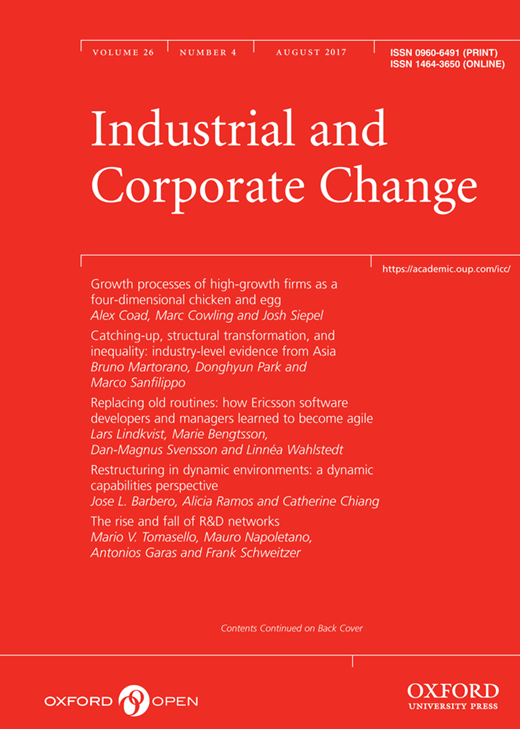
Lingering Illness or Sudden Death? Pre-exit Employment Developments in German Establishments
in: Industrial and Corporate Change, Nr. 4, 2014
Abstract
Using a large administrative data set for Germany, this article compares employment developments in exiting and surviving establishments. Applying a matching approach, we find a clear “shadow of death” effect reflecting lingering illness: in both West and East Germany establishments shrink dramatically already several years before closure, employment growth rates differ strongly between exiting and surviving establishments, and this difference becomes stronger as exit approaches. Moreover, we provide first evidence that prior to exit the workforce becomes on average more skilled, more female, and older in exiting compared to surviving establishments. These effects are more clearly visible in West than in East Germany.

What Can We Learn from Bargaining Models about Union Power? The Decline in Union Power in Germany, 1992–2009
in: Manchester School, Nr. 3, 2014
Abstract
Building on the right-to-manage model of collective bargaining, this paper tries to infer union power from the observed results in wage setting. It derives a time-varying indicator of union strength taking account of taxation, unemployment benefits, and the labour market situation and confronts this indicator with annual data for Germany. The results show that union power did not change much from 1992 to 2002 but fell markedly (by about one-third) from 2002 to 2007 in the aftermath of substantial labour market reforms.
Arbeitspapiere
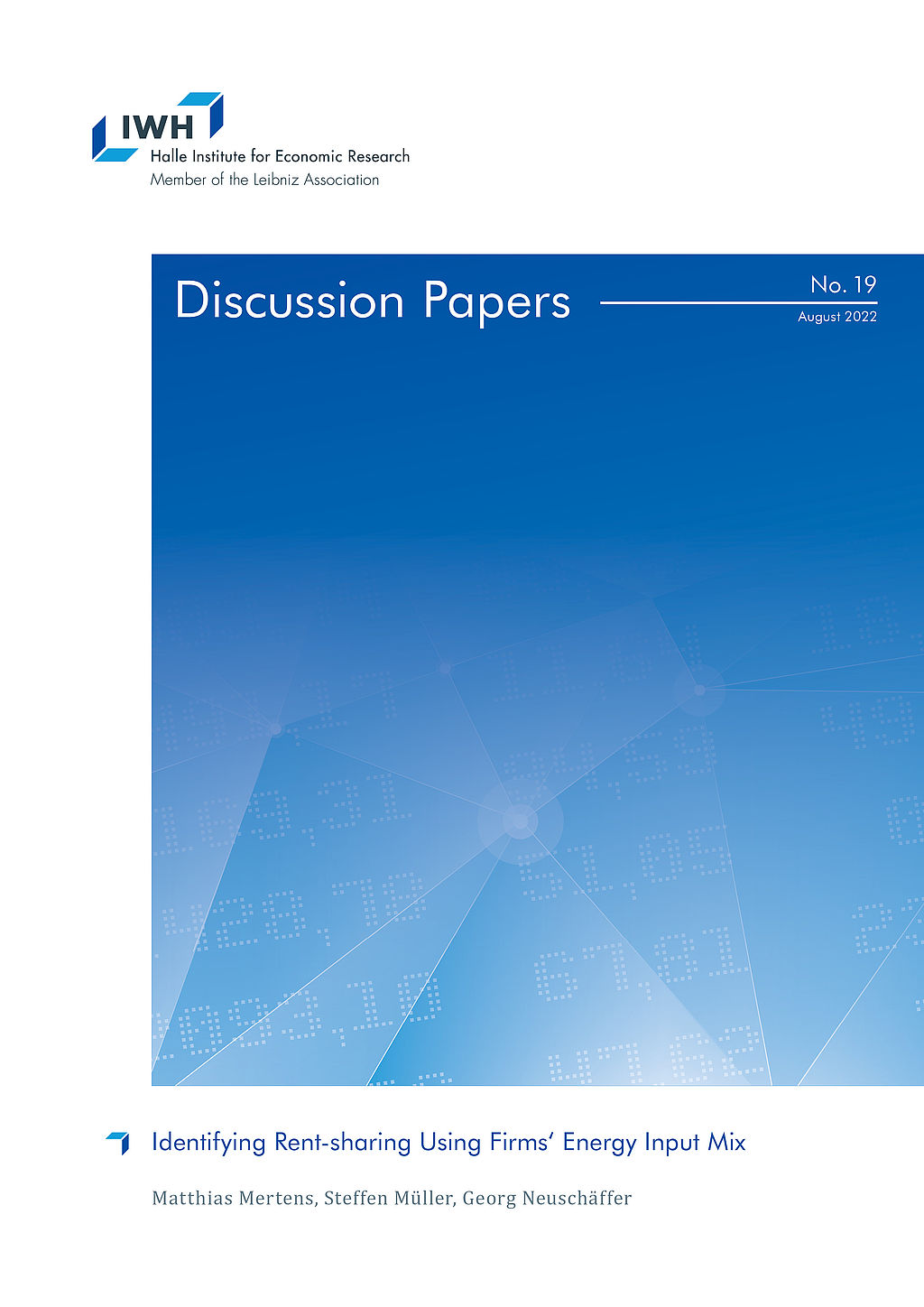
Identifying Rent-sharing Using Firms' Energy Input Mix
in: IWH Discussion Papers, Nr. 19, 2022
Abstract
We present causal evidence on the rent-sharing elasticity of German manufacturing firms. We develop a new firm-level Bartik instrument for firm rents that combines the firms‘ predetermined energy input mix with national energy carrier price changes. Reduced-form evidence shows that higher energy prices depress wages. Instrumental variable estimation yields a rent-sharing elasticity of approximately 0.20. Rent-sharing induced by energy price variation is asymmetric and driven by energy price increases, implying that workers do not benefit from energy price reductions but are harmed by price increases. The rent-sharing elasticity is substantially larger in small (0.26) than in large (0.17) firms.
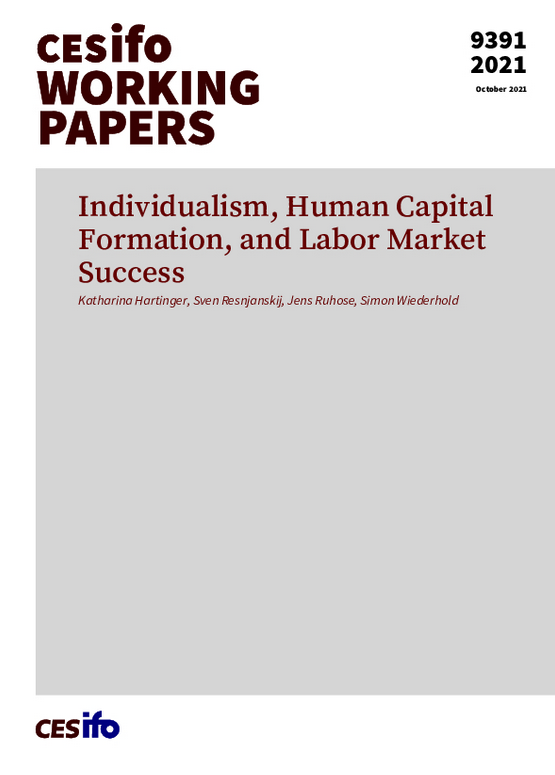
Individualism, Human Capital Formation, and Labor Market Success
in: CESifo Working Paper, Nr. 9391, 2021
Abstract
There is an ongoing debate about the economic effects of individualism. We establish that individualism leads to better educational and labor market outcomes. Using data from the largest international adult skill assessment, we identify the effects of individualism by exploiting variation between migrants at the origin country, origin language, and person level. Migrants from more individualistic cultures have higher cognitive skills and larger skill gains over time. They also invest more in their skills over the life-cycle, as they acquire more years of schooling and are more likely to participate in adult education activities. In fact, individualism is more important in explaining adult skill formation than any other cultural trait that has been emphasized in previous literature. In the labor market, more individualistic migrants earn higher wages and are less often unemployed. We show that our results cannot be explained by selective migration or omitted origin-country variables.
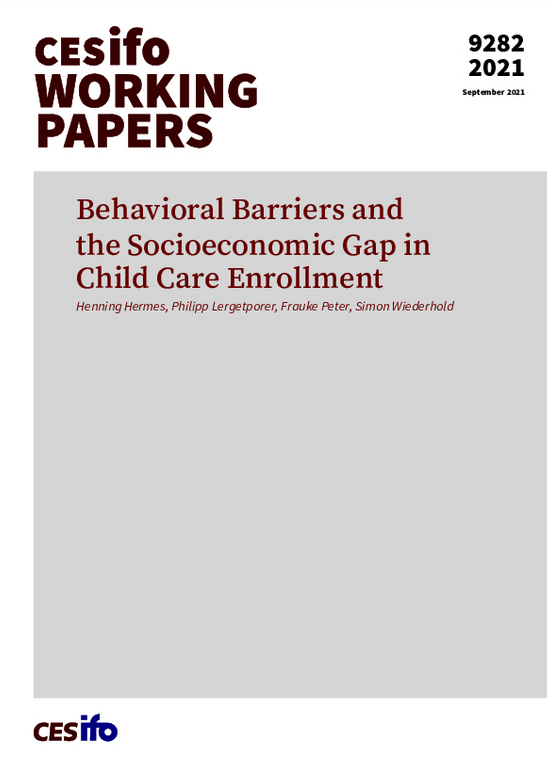
Behavioral Barriers and the Socioeconomic Gap in Child Care Enrollment
in: CESifo Working Paper, Nr. 9282, 2021
Abstract
Children with lower socioeconomic status (SES) tend to benefit more from early child care, but are substantially less likely to be enrolled. We study whether reducing behavioral barriers in the application process increases enrollment in child care for lower-SES children. In our RCT in Germany with highly subsidized child care (n > 600), treated families receive application information and personal assistance for applications. For lower-SES families, the treatment increases child care application rates by 21 pp and enrollment rates by 16 pp. Higher-SES families are not affected by the treatment. Thus, alleviating behavioral barriers closes half of the SES gap in early child care enrollment.
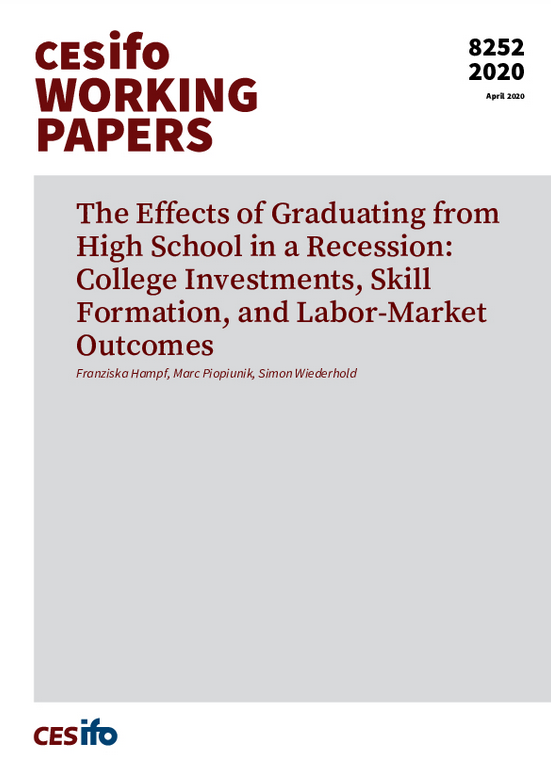
The Effects of Graduating from High School in a Recession: College Investments, Skill Formation, and Labor-Market Outcomes
in: CESifo Working Paper, Nr. 8252, 2020
Abstract
We investigate the short- and long-term effects of economic conditions at high-school graduation as a source of exogenous variation in the labor-market opportunities of potential college entrants. Exploiting business cycle fluctuations across birth cohorts for 28 developed countries, we find that bad economic conditions at high-school graduation increase college enrollment and graduation. They also affect outcomes in later life, increasing cognitive skills and improving labor-market success. Outcomes are affected only by the economic conditions at high-school graduation, but not by those during earlier or later years. Recessions at high-school graduation narrow the gender gaps in numeracy skills and labor-market success.

Identifying Bankruptcies in German Social Security Data
in: FDZ-Methodenreport, Nr. 10, 2017
Abstract
In empirischen Studien über Firmenschließungen wird häufig die Notwendigkeit betont, zwischen verschiedenen Arten von Schließungen, z.B. freiwilligen und unfreiwilligen, zu unterscheiden. Dieser Methodenreport erläutert vor diesem Hintergrund, wie im Betriebs-Historik-Panel (BHP) Betriebsstillegungen aufgrund von Insolvenzen identifiziert werden können. Insolvenzen können im Gegensatz zu anderen Schließungen eindeutig als Ausdruck ökonomischen Scheiterns und somit als unfreiwillige Schließungen interpretiert werden. (Autorenreferat, IAB-Doku)


















